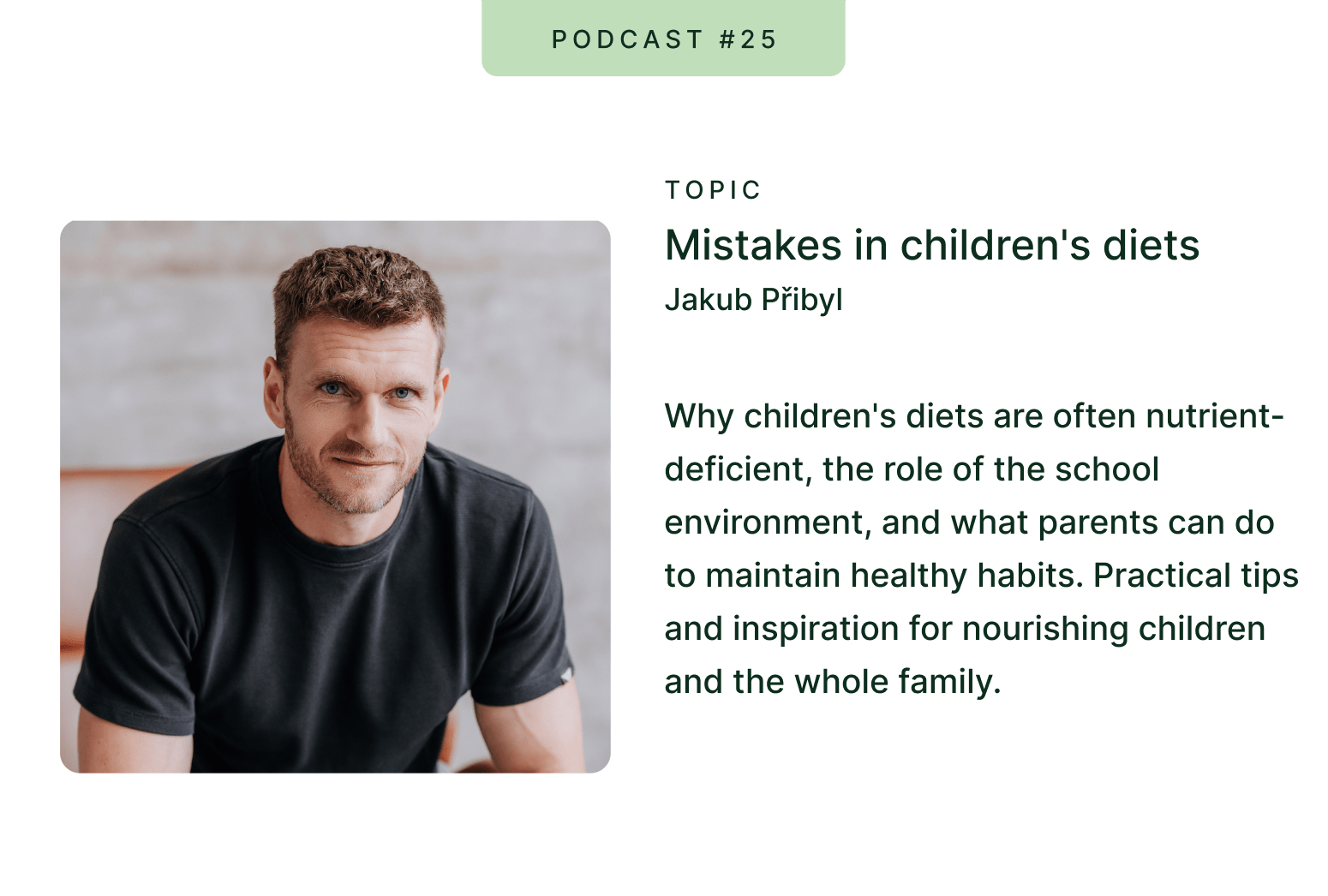W tym odcinku podcastu Trime zagłębiamy się w temat wapnia. Dowiesz się więcej o jego znaczeniu dla zdrowia i odżywiania oraz o tym, jak prawidłowo optymalizować jego spożycie.
Omawiamy różne źródła wapnia, różnice między formami naturalnymi a syntetycznymi oraz to, jak minerały naturalnie występujące w algach mogą poprawić wchłanianie tego niezbędnego minerału. Badamy również znaczenie monitorowania spożycia wapnia w kontekście ogólnej homeostazy organizmu oraz jak utrzymać równowagę wapniową w powiązaniu z przyjmowaniem innych składników odżywczych – takich jak witaminy D3, K2 i magnez.
Zwróciliśmy się również do konkretnych grup, takich jak kobiety w ciąży i osoby z osteoporozą, dla których odpowiednia suplementacja wapnia jest kluczowa. Zastanawiasz się, jak prawidłowo suplementować wapń, aby uniknąć nadmiernego spożycia i toksyczności? Ten podcast jest dla wszystkich, którzy chcą zgłębić temat i dowiedzieć się więcej o optymalizacji spożycia wapnia dla zdrowia kości i ogólnego stanu zdrowia.
Podcast nr 43 w skrócie:
→ Główne źródła wapnia w diecie
→ Czy możliwe jest uzyskanie wystarczającej ilości wapnia bez spożywania produktów mlecznych?
→ Zalecane dzienne spożycie
→ Czy można zmierzyć poziom wapnia we krwi? Jak inaczej mogę sprawdzić, czy dostarczam organizmowi wystarczającą ilość wapnia z pożywieniem?
→ Biodostępność wapnia i czynniki na nią wpływające – w jaki sposób organizm wchłania wapń
→ Aktywność fizyczna a suplementacja wapnia – kiedy i jak prawidłowo suplementować
→ Jak uzyskać wystarczającą ilość wapnia z pożywienia – ile i co spożywać
→ Osteoporoza i jej związek z wapniem – jak pomaga odpowiednia suplementacja
→ Zawartość białka a wapń – jakie źródła wybierać, aby uniknąć przeciążenia
→ Kofaktory dietetyczne wspomagające metabolizm wapnia
→ Wybór źródeł wapnia w zależności od grup docelowych – kobiet w ciąży, sportowców, osób z osteoporozą, wegan
→ Suplementacja magnezem – na co wpływa i jaki ma związek z wapniem
→ Ryzyko związane z suplementacją
→ Jaka jest najlepsza forma wapnia – korzyści płynące z naturalnej formy z alg i połączenia z witaminami D i K2
Wszystkie podcasty z napisami znajdziesz również na naszym kanale YouTube .
Transkrypcja podcastu:
[00:00:10] Michał
Kontynuujemy nasz mini-serial o mikroskładnikach, tym razem skupiając się na wapniu. Ponownie witamy Jakuba Přibyla.
[00:00:18] Jakub
Cześć.
[00:00:20] Michał
Cześć, dzień dobry. Dziękuję za ponowne dołączenie. Niektórych ten temat bezpośrednio dotyczy, inni mogą nawet nie zdawać sobie sprawy, że powinni dbać o wapń. Jakub, zaczynajmy. Wapń to kluczowy minerał, wszyscy o tym wiedzą – albo pamiętają ze szkoły, gdzie promowali mleko jako produkt bogaty w wapń. Co o tym sądzisz?
[00:00:50] Jakub
Miejmy nadzieję, że to już dawno przeżytek, ale wapń jest niewątpliwie niezwykle ważny. Pytanie nie brzmi, czy dostarczamy organizmowi wystarczającą ilość wapnia w diecie, ale jak dobrze potrafimy go wykorzystać. Dlatego głównym tematem dzisiejszego dnia będzie homeostaza wapniowo-fosforanowa – a szerzej, równowaga wapniowa.
[00:01:14] Michał
Krótko mówiąc, jak zachować równowagę.
[00:01:18] Jakub
Tak, równowaga. Jak organizm gospodaruje wapniem.
[00:01:22] Michał
Jakie są więc główne źródła wapnia? Zacznijmy po prostu – według Wikipedii to produkty mleczne?
[00:01:53] Michał
Więc nabiał jest numerem jeden. Co dalej?
[00:02:00] Jakub
Mogą to być również warzywa, ale nabiał jest tak naprawdę głównym źródłem. Niektóre warzywa mają dobrą biodostępność wapnia, ale tak jak brukselka – ludzie nie jedzą ich zbyt często.
[00:02:50] Michał
Rozumiem, nabiał jest na prowadzeniu, ale może to być problem dla osób z nietolerancją. Czy jeśli wyeliminuję nabiał, mogę uzyskać wystarczającą ilość wapnia z samej diety bez suplementów?
[00:03:10] Jakub
Uzyskanie dawek wapnia na poziomie grama wyłącznie z pożywienia jest trudne, ponieważ zalecane dzienne spożycie to 800, 1000, a nawet 1200 mg. Dla kobiet w ciąży lub karmiących piersią jest to więcej. Osobiście uważam, że większość osób mogłaby sobie poradzić z mniejszą ilością, jeśli mają również kofaktory, które pomagają utrzymać równowagę wapniową.
[00:04:03] Michał
Jeśli więc nie chcę popadać w skrajności, to jaki jest rozsądny zakres, do którego powinienem dążyć?
[00:04:15] Jakub
Myślę, że około 600 do 800 mg dziennie. Dla kobiet w ciąży dawka będzie wyższa, ale ważne jest, aby monitorować i dostosowywać dawkę indywidualnie.
[00:04:38] Michał
Czy mogę zbadać poziom wapnia we krwi?
[00:04:42] Jakub
Teoretycznie tak, ale wapń występuje we krwi w trzech formach, więc badanie daje jedynie podstawowy obraz. Należy również monitorować czynność nerek i metabolizm kości – to bardziej złożone.
[00:05:00] Michał
Więc nie jest to takie proste jak z witaminą D.
[00:05:02] Jakub
Dokładnie. Określenie poziomu wapnia nie jest łatwe i wymaga uwzględnienia kilku parametrów.
Jak mogę sprawdzić, czy mam niedobór czy nadmiar wapnia?
Czyli wywnioskowałbyś to na podstawie tego, co jem?
[00:05:19] Jakub
Tak, nawyki żywieniowe są najlepszym wskaźnikiem. I oczywiście, jak wspomniałem, u kobiet w ciąży lub osób w okresie menopauzy biodostępność wapnia może naturalnie wzrosnąć.
[00:06:05] Michał
A jakich rad udzieliłbyś, aby uniknąć problemów związanych z nadmiarem lub niedoborem wapnia?
[00:06:17] Jakub
Chciałbym poznać Twoją dietę i poziom aktywności fizycznej. Ważne jest, czy Twoje kości są stymulowane. Jeśli jesteś długotrwale przykuty do łóżka, zalecałbym obniżenie spożycia wapnia.
[00:06:51] Jakub
Do prawidłowej aktywacji wapnia potrzebna jest aktywność fizyczna – taka jak skakanka czy ćwiczenia oporowe. Jazda na rowerze nie wystarczy, ponieważ obciążenie kości jest minimalne.
[00:08:19] Michał
Czy zatem mogę sobie pozwolić na większe obciążenie szkieletu, jeśli popełnię więcej błędów żywieniowych? A może organizm lepiej wykorzysta wapń, jeśli będę go spożywać w wystarczającej ilości?
[00:08:39] Jakub
Tak, to ważny czynnik.
[00:08:42] Michał
Jeśli więc moja dieta nie jest idealna, ale jestem aktywna fizycznie, czy mogę sobie trochę odpuścić?
[00:08:57] Jakub
Zdecydowanie. Nadal jednak konieczne jest zapewnienie minimalnego spożycia wapnia – najlepiej z pożywienia lub suplementów. Suplementacja w dużych dawkach może być problematyczna, ponieważ badania wykazały, że nadmiar wapnia może wiązać się z wyższym ryzykiem chorób sercowo-naczyniowych.
[00:09:44] Michał
Skupmy się zatem na minimalnym spożyciu. Ile wapnia powinienem spożywać tygodniowo, aby nie spaść poniżej normy?
[00:10:01] Jakub
Jeśli zajdziemy w skrajnych przypadkach, wystarczająca będzie dawka 400 mg dziennie, ale polecam trzymać się dawki 600–800 mg dziennie, niezależnie od tego, czy będzie ona dostarczana z pożywieniem, czy suplementami.
[hal]
Jeśli skupimy się na produktach mlecznych, to prawdopodobnie jest to główny czynnik, dzięki któremu nie przekroczymy maksymalnego spożycia, powiedzmy 30–40 gramów sera dziennie, a następnie uzupełnimy je innymi źródłami?
[00:12:55] Jakub
Zależy to od formy, w jakiej wapń jest związany z białkami. I oczywiście, nigdy nie jest to takie proste.
[00:13:02] Michał
Naprawdę lubisz się w to zagłębiać, prawda?
[00:13:04] Jakub
Tak, robię to, ponieważ na przykład używam serów, które się ścinają i większość wapnia zostaje wypłukana w trakcie procesu.
[00:13:18] Michał
Jakie to rodzaje sera?
[00:13:20] Jakub
Podobnie jak twaróg. Twaróg ma mało wapnia, mimo że jest bogaty w białko. Wapń nie jest związany z tłuszczem ani suchą masą, ale z białkiem – a konkretnie z micelami kazeiny.
[00:13:36] Michał
Czyli zawiera go może połowę mniej niż parmezan?
[00:13:39] Jakub
Tak, twaróg ma około 100–120 mg, a parmezan może mieć od 800 do 900 mg. Jeśli chcesz zwiększyć spożycie białka – szczególnie dla sportowców siłowych, dzieci i kobiet z problemami z białkiem – produkty mleczne są doskonałym źródłem. Ale jeśli nie jesteś tego świadomy, łatwo możesz przedawkować wapń. Jogurt, kefir, serwatka, parmezan, sery – możesz łatwo przekroczyć zalecane spożycie.
[00:14:55] Michał
Czyli jeśli połączę ser i twaróg, nie powinno być problemu?
[00:15:02] Jakub
Jeśli ograniczysz się do spożywania jednej porcji nabiału dziennie, nic ci nie będzie.
[00:15:08] Michał
Czyli jeśli zachowam równowagę, wszystko powinno być w porządku — nawet jeśli czasami trochę przesadzę?
[00:15:17] Jakub
Dokładnie.
[00:15:18] Michał
Świetnie, rozumiem. Nie możemy podać dokładnych instrukcji, ale mamy trzy artykuły na blogu o wapniu. Czy przygotowujemy coś nowego, czy aktualizujemy to na podstawie tego odcinka?
[00:15:36] Jakub
Główny nacisk położony jest na to, że nie można po prostu obliczyć wszystkiego na podstawie tabel wartości odżywczych. Wapń to nie jedyny składnik, który powinniśmy monitorować. Niedobór jest znany, ale nadmiar również może stanowić problem.
[00:15:55] Michał
To niezbyt popularny temat, prawda? Ale skupmy się teraz na konkretnych grupach docelowych, takich jak kobiety w ciąży czy osoby z osteoporozą. Na co powinnam zwrócić uwagę w diecie, aby wszystko działało jak należy? Zakładam, że witamina D jest najczęściej omawiana.
[00:16:18] Jakub
Tak, witamina D reguluje wchłanianie wapnia, ale jeśli w diecie jest go wystarczająco dużo, działa nawet bez niego. Wapń wchłania się poprzez gradient stężeń – jeśli w pożywieniu jest go wystarczająco dużo.
[00:16:37] Michał
Jeśli więc mam wystarczającą ilość wapnia, witamina D nie jest aż tak istotna?
[00:16:39] Jakub
Dokładnie. To samo dotyczy magnezu. Jeśli masz zdrowy żołądek, wchłanianie odbywa się w całym przewodzie pokarmowym, w tym w jelicie grubym. Ważniejsza jest równowaga mineralna. Witamina D poprawia wchłanianie wapnia tylko wtedy, gdy masz jego niedobór.
Dlaczego warto łączyć wapń z witaminami D3 i K2?
[00:17:22] Michał
Idealnie byłoby, gdyby poziom witaminy D mieścił się w optymalnym zakresie.
[00:17:26] Jakub
Nie ma co do tego wątpliwości, jednak nie jest to spowodowane głównie wapniem.
[00:17:29] Michał
A jaki jest drugi najważniejszy czynnik?
[00:17:49] Jakub
Witamina K2 pełni ważną funkcję w aktywowaniu komórek kostnych, które włączają wapń do tkanki kostnej — lub usuwają go, gdy jest to konieczne.
[00:18:10] Michał
Dzięki witaminie K2 wapń jest lepiej wykorzystywany przez organizm.
[00:18:15] Jakub
Dokładnie. Jeśli masz zarówno witaminę D, jak i K2, biodostępność wapnia znacznie się poprawia.
[00:18:23] Michał
Czyli jeśli mam witaminę D i K2, wapń wchłania się wydajniej i nie stanowi zagrożenia?
[00:18:36] Jakub
Jeśli masz odpowiedni poziom witaminy D i K2, wapń jest bezpieczny.
[00:18:40] Michał
A jeśli we krwi znajduje się nadmiar wapnia, czy trafia on tam, gdzie powinien – do kości i zębów?
[00:18:52] Jakub
Tak, dokładnie. Wapń w organizmie jest regulowany tak, aby trafiał tam, gdzie jest potrzebny.
[00:19:04] Jakub
Czy są jakieś inne czynniki, o których powinniśmy pamiętać?
[00:19:15] Jakub
Inne czynniki zależą od źródła wapnia w suplementach, jednak najważniejszą kwestią jest równowaga minerałów.
[00:19:41] Michał
Czy ryzyko przedawkowania wapnia w przypadku kobiet w ciąży jest minimalne, zwłaszcza w drugim i trzecim trymestrze?
[00:20:14] Jakub
Tak, zapotrzebowanie na wapń wzrasta w czasie ciąży, ponieważ dziecko potrzebuje wapnia do rozwoju kości. Niedobór wapnia u kobiety w ciąży może mieć negatywny wpływ na jej zdrowie, a nie na zdrowie dziecka.
[00:20:30] Michał
Czyli kobieta w ciąży czerpie wapń z własnej masy kostnej?
[00:20:47] Jakub
Tak. Jeśli brakuje wapnia, organizm kompensuje to poprzez zwiększenie aktywności osteoklastów, które pobierają wapń z kości.
[00:20:53] Michał
Jakie zatem są zalecenia żywieniowe dla kobiet w ciąży?
Ważne jest, aby jeść wystarczającą ilość warzyw. Dwie porcje dziennie dostarczają około 50–100 mg wapnia, choć biodostępność jest zróżnicowana.
Więc jeśli będę dodawać porcję parmezanu każdego dnia, będę bezpieczny.
[00:22:26] Jakub
Tak, sery są zdecydowanie najlepszym źródłem wapnia.
[00:22:52] Michał
Dlatego szczególnie w trzecim trymestrze należy zwracać na to szczególną uwagę.
[00:22:56] Jakub
Jeśli stosujesz dietę bezmleczną, zdecydowanie położyłbym nacisk na wapń. W przypadku kobiet w ciąży suplementacja jest uzasadniona, ponieważ uzyskanie wystarczającej ilości wapnia z samej diety może być bardzo trudne. Jeśli spożycie jest niskie, należy skupić się na maksymalizacji wchłaniania wapnia – co może być dość wymagające.
[00:23:21] Michał
Jeśli kobieta w ciąży nie jest pewna, lepiej nieznacznie zwiększyć spożycie wapnia. Trzy miesiące nieznacznie wyższej podaży nie wyrządzą szkody. Lepiej trochę więcej niż za mało.
[00:23:37] Jakub
Zdecydowanie. Jeśli suplementacja jest dobrze zaprojektowana, będzie zawierać również inne składniki, takie jak witaminy D, K2 i magnez. Nie chodzi więc tylko o sam wapń. Niektóre suplementy zawierają tylko cytrynian wapnia, ale lepiej jest podejść do tego kompleksowo.
[00:24:10] Michał
Suplementacja magnezem jest obecnie bardzo popularna – mówi się, że to suplement numer jeden. Jeśli przyjmuję magnez w większych dawkach, na co powinienem zwrócić uwagę w odniesieniu do wapnia?
[00:24:30] Jakub
Przyjmowanie magnezu w małych ilościach nie stanowi problemu. Jednak w większych dawkach może on zakłócać układy transportowe i konkurować z wapniem. Suplementacja dużych ilości magnezu może nie być idealnym rozwiązaniem – szczególnie dla kobiet w ciąży. Ważne jest, aby unikać skrajności.
[00:25:13] Michał
Z magnezem można przesadzić, prawda?
[00:25:14] Jakub
Tak, zdecydowanie. Suplementacja 400 mg może prowadzić do niedoboru wapnia.
[00:25:27] Michał
Ciekawe. Omówiliśmy już kobiety w ciąży, ale wiele osób cierpi na osteoporozę. W Czechach dotyczy to co trzeciej kobiety i co piątego mężczyzny po 50. roku życia. Wydaje mi się, że to dużo.
[00:25:47] Jakub
Tak, dokładnie. Gdyby skanowanie DXA było powszechnie stosowane, liczby prawdopodobnie byłyby jeszcze gorsze. Większość ludzi nawet nie wie, że ma osteoporozę.
[00:25:57] Michał
Kiedy zazwyczaj dowiadujesz się, że jesteś nosicielem tej choroby?
[00:25:59] Jakub
Zwykle, gdy złamiesz kość. Tak diagnozuje się to w codziennej praktyce.
[00:26:04] Michał
A jak wygląda leczenie w praktyce? Co o tym myślisz?
[00:26:30] Jakub
Rozwiązaniem nie jest wyłącznie zwiększenie spożycia wapnia, poprzez suplementy lub dietę.
[00:26:38] Michał
W każdym razie nie dociera do kości.
[00:26:39] Jakub
Dokładnie. Samo zwiększenie spożycia wapnia nie poprawia stanu zdrowia. Długoterminowe badania pokazują, że nadmierne spożycie wapnia może wiązać się ze zwiększonym ryzykiem chorób sercowo-naczyniowych.
[00:26:53] Michał
Wiemy, że niedobór witaminy D może zmniejszyć wchłanianie wapnia nawet o 50%, a połączenie witaminy K2 z D może poprawić wchłanianie wapnia do kości o 25%.
[00:27:30] Jakub
W przypadku osteoporozy podstawą jest odpowiednia ilość wapnia z pożywienia – najlepiej około 700 mg dziennie. Jednak w przypadku zdiagnozowanej osteoporozy kluczowe jest również utrzymanie optymalnego poziomu witaminy D – około 150 nmol/l. Poziomy te należy monitorować, najlepiej dwa razy w roku. Badanie jest proste – można je wykonać za pomocą DBS (suchej kropli krwi) lub standardowego pobrania krwi.
[00:29:17] Michał
Jeśli mam dostęp do źródeł dobrej jakości, takich jak rolnictwo regeneratywne lub jaja hodowane na własnym podwórku, wszystko powinno być w porządku.
[00:29:22] Jakub
Jeśli dieta jest zróżnicowana, nie ma problemu. Weganie mogą mieć problemy z przyjmowaniem wapnia, ale jeśli są dobrze poinformowani, mogą spożywać najlepsze jego źródła o najwyższej biodostępności.
[00:30:13] Michał
Jeśli twoja dieta jest zróżnicowana, możesz uzyskać wystarczającą ilość wapnia, nawet jeśli nie jesz „białego chleba”.
[00:30:27] Jakub
Dokładnie. A jeśli spożywasz różnorodne źródła – takie jak fermentowane produkty spożywcze lub wysokiej jakości produkty pochodzenia zwierzęcego – Twój organizm wchłonie je lepiej niż w typowej diecie mieszanej. Diety wegańskie mogą mieć problemy z biodostępnością, ponieważ niektóre minerały wiążą się w niestrawne kompleksy.
[00:30:39] Michał
Czy to w porządku, jeśli skupię się na rolnictwie regeneratywnym lub hodowli jaj przydomowych?
[00:30:50] Jakub
Tak, to idealne rozwiązanie. Źródła o wysokiej biodostępności – takie jak fermentowana żywność i wysokiej jakości produkty pochodzenia zwierzęcego – są najskuteczniejsze.
[00:32:06] Michał
Kompleksowe statystyki – to nie jest łatwe. Czasami wskazują na problemy, ale…
[00:32:11] Jakub
Właśnie o to chodzi – kiedy już się o tym wie, wymaga to zaangażowania. Jeśli jesz wszystko w najwyższej możliwej jakości, nie powinieneś popadać w skrajności.
[00:32:18] Michał
Dokładnie – to jest klucz. Znalezienie równowagi.
[00:32:29] Jakub
Większość rzeczy sprowadza się do tego, że to, co dziś uważamy za „normalne” jedzenie, w rzeczywistości jest również ekstremalne. Dlatego zarówno weganie, jak i „mięsożercy” mogą napotkać problemy, jeśli nie zadbają o równowagę. Weganin koncentruje się na jednym składniku, podczas gdy mięsożerca na innym.
[00:32:59] Michał
Kobiety są dotknięte tą chorobą bardziej, głównie z powodu osteoporozy, prawda?
[00:33:04] Jakub
Tak, to połączenie profilu hormonalnego, niższej masy mięśniowej szkieletowej i oczywiście menopauzy. Nawyki żywieniowe również mają na to wpływ – ale trudno wskazać jedną przyczynę.
[00:33:21] Michał
Trudno jest przeprowadzić dokładne badania, prawda?
[00:33:24] Jakub
Tak, większość zagadnień związanych z żywieniem jest trudna do studiowania.
[00:33:31] Michał
Jakie są Twoje szacunki w praktyce? Ile osób przyjmuje za mało wapnia, a ile za dużo?
[00:33:43] Jakub
Trudno powiedzieć. Wolałbym podzielić to na grupy. Jeśli spojrzymy na ogólne spożycie wapnia, nie powinno to stanowić problemu – ale kluczowa jest równowaga i homeostaza. Jeśli spożycie jest niskie, skup się na czynnikach, które wspomagają wykorzystanie wapnia. Jeśli jest zbyt wysokie, uważaj na mikroskładniki odżywcze, które mogą neutralizować potencjalną toksyczność.
[00:34:31] Michał
Więc równowaga przede wszystkim. To jasne.
[00:34:45] Jakub
Tak, należy wyciągnąć wniosek, że ilość przyjmowanego wapnia nie jest aż tak ważna jak to, jak dobrze organizm go wykorzystuje — i ogólna równowaga.
[00:35:43] Michał
Chcielibyśmy przedstawić nasz nowy produkt wapniowy. Dlaczego zdecydowaliśmy się na roślinne źródło wapnia z alg?
[00:35:55] Jakub
Istnieje kilka możliwości pozyskiwania wapnia – na przykład skorupki jaj lub inne rodzaje alg. To źródło glonów jest przyjazne dla środowiska, ponieważ zbierane są wyłącznie algi wyrzucone na brzeg, a nie zbierane z dna morskiego. Lepsze właściwości wapnia zapewnia również obecność innych minerałów, które wspierają homeostazę wapnia, w tym strontu, który pomaga aktywować komórki kostne.
[00:36:28] Michał
Dla nas ważne było, aby źródło było ekologiczne i aby żadne statki nie były wykorzystywane do grabieży oceanów. To tylko wyrzucone na brzeg algi.
[00:36:35] Jakub
Dokładnie. Długo zastanawialiśmy się między skorupkami jaj a algami, ale to źródło ma lepsze parametry pod względem dodatkowej zawartości minerałów. Jest suszone na słońcu, zbierane ręcznie, a dzięki technologii przetwarzania wapń ma wysoką porowatość, co poprawia jego użyteczność.
[00:37:09] Michał
Koncepcja ta szanuje sposób, w jaki stworzyła ją natura.
[00:38:14] Jakub
Użyteczność tego wapnia jest dobra, nawet jeśli stan Twojego żołądka nie jest idealny. Ten rodzaj wapnia pozwala na lepsze wchłanianie nawet przy niskim pH żołądka.
[00:38:29] Michał
Postanowiliśmy, że w naszym produkcie wapń będzie obecny tylko w połączeniu z witaminami D3 i K2 – nie oferujemy wapnia w czystej postaci. Jakub dobrze to wyjaśnił – takie podejście jest bezpieczniejsze dla klienta.
[00:39:21] Jakub
Trudno było znaleźć odpowiednie proporcje, aby dawkowanie miało sens i nie istniało ryzyko przedawkowania witaminy D lub K2. Co ważne, nawet dawka podstawowa zawiera skuteczne ilości tych witamin, które wspierają homeostazę.
[00:39:41] Michał
Świetnie – tak to już mamy. Czy chciałbyś coś jeszcze dodać?
[00:39:44] Jakub
To wszystko.
[00:39:45] Michał
Chcielibyśmy poznać Twoją opinię na ten temat. Otrzymaliśmy opinie, że jest on zbyt techniczny, ale skupiamy się na osobach, które chcą zgłębić temat. W dzisiejszych czasach łatwo znaleźć podstawowe informacje — chcemy oferować bardziej szczegółowe wyjaśnienia.
[00:40:07] Jakub
Do widzenia.












